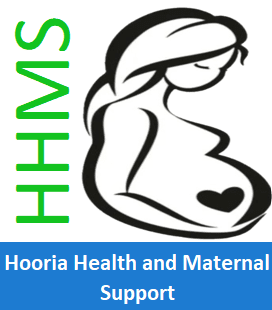The Ultimate Pregnancy Nutrition Guide (for First-Time Moms)

Posted on October 20th, 2025
Introduction: Nourishing Two Lives with Every Bite
Pregnancy is one of the most powerful transformations your body will ever experience. Each meal becomes more than fuel; it’s nourishment for two growing lives. For first-time moms, though, the advice about what to eat (and what to avoid) can feel overwhelming.
At Hooria Health and Maternal Support, we help expecting mothers build balanced, culturally familiar nutrition plans that keep both mom and baby healthy. Here’s a simple, science-backed guide to understanding pregnancy nutrition, without the stress.
1. The Basics: What “Eating for Two” Really Means
The phrase “eating for two” doesn’t mean doubling your portions. In fact, most women only need about 300 extra calories per day during the second and third trimesters.
Instead of eating more, focus on eating nutrient-dense foods, meals rich in vitamins, minerals, protein, and fiber. Think: colorful vegetables, lean proteins, whole grains, and healthy fats.
2. The Essential Nutrients for Pregnancy
Let’s break down a few key nutrients your body (and baby) need most:
• Folate (Folic Acid) – Helps prevent birth defects and supports brain development. Sources: dark leafy greens, lentils, fortified cereals.
• Iron – Keeps oxygen flowing through your body and prevents anemia. Sources: spinach, beans, red meat, and iron-fortified grains.
• Calcium – Builds your baby’s bones and teeth. Sources: yogurt, milk, cheese, and tofu.
• Protein – Strengthens muscles and tissue for both mom and baby. Sources: eggs, poultry, fish (low mercury), beans, lentils, nuts.
• DHA (Omega-3s) – Aids in brain and eye development. Sources: salmon, walnuts, chia seeds.
• Vitamin D – Supports bone health and immune function. Sources: fortified milk, eggs, and safe sunlight exposure.
3. Foods to Limit or Avoid
Not everything that’s healthy outside of pregnancy is safe during it. Here are a few foods to limit or skip altogether:
• High-mercury fish (like swordfish, king mackerel, tilefish)
• Raw or undercooked seafood, meat, or eggs
• Unpasteurized milk and soft cheeses
• Deli meats (unless reheated)
• Excess caffeine (limit to 200 mg/day)
• Alcohol (avoid completely)
When in doubt, check with your healthcare provider or talk to your Hooria care team for personalized guidance.
4. Sample Day of Balanced Meals
Breakfast: Oatmeal with berries, almonds, and a glass of fortified orange juice.
Lunch: Grilled chicken or chickpea salad with leafy greens, avocado, and olive oil dressing.
Snack: Greek yogurt with fruit or a handful of nuts.
Dinner: Baked salmon, brown rice, and steamed broccoli.
Evening Treat: Warm milk with cinnamon or a fruit smoothie.
Simple, satisfying, and full of nutrients, your meals can be both comforting and healing.
5. Managing Common Pregnancy Nutrition Challenges
Morning Sickness: Try small, frequent meals, ginger tea, or plain crackers. Avoid strong smells and greasy foods.
Heartburn: Eat smaller portions and avoid lying down right after eating. Focus on gentle, warm meals.
Cravings: Cravings are normal! Satisfy them in healthy ways, swap ice cream for yogurt, or chips for roasted chickpeas.
Food Access Challenges: If finding nutritious foods is difficult, Hooria Health and Maternal Support connects families to community food programs and baby supply assistance, ensuring every mother gets the nutrition she deserves.
6. Hydration Matters Too
Water supports every function of your body during pregnancy. Aim for 8–10 glasses per day and add hydrating foods like watermelon, cucumber, and oranges. If plain water gets boring, infuse it with fruit or herbs for flavor.
7. Cultural Foods and Pregnancy Nutrition
At Hooria Health and Maternal Support, we honor traditional foods and recipes that hold cultural meaning. Whether it’s spiced lentils, injera, rice dishes, or herbal teas, our team helps adapt these favorites safely into your pregnancy plan, because nutrition should never mean giving up heritage.
8. When to Seek Professional Guidance
If you’re struggling with appetite changes, nausea, or special dietary needs (such as diabetes, vegetarian diets, or allergies), talk to a healthcare provider or a nutrition specialist. Personalized plans ensure your body and baby get everything they need.
Final Thoughts: Start a Conversation About Pregnancy Nutrition
Every pregnancy is unique, but good nutrition is universal. With the right foods, habits, and guidance, you can feel stronger, more energized, and more confident throughout your journey.
If you’d like one-on-one guidance, reach out to Hooria Health and Maternal Support. Our compassionate team can help you create a nutrition plan that reflects your culture, honors your body, and supports your baby’s growth, step by step.
Contact Hooria Health and Maternal Support today to start a conversation about healthy eating and pregnancy care.
Contact Us
Reach Out Today
Explore our caring maternal health solutions designed for you. Connect with our team today and begin a journey towards empowerment and support for you and your family.
